World Politics Review contributors John Nagl of the Center for a New American Security and Brian Katulis of the Center for American Progress discuss the conflict of visions for the way forward in Afghanistan with NewsHour’s Ray Suarez. Katulis and Nagl discuss recent discouraging statements by Afghan President Hamid Karzai and how a competing vision for the future of Afghanistan could affect allied forces’ operation there.
Asia-Pacific Archive
Free Newsletter
I didn’t get to enjoy a full-fledged media fast during the three weeks I was away, as I managed to do last summer. But I did limit myself to urgent e-mails, the occasional online news item, and some print magazine reading. And I consider that kind of break from the information onslaught a vital exercise for the way it allows you to focus back in on the big stories that are sometimes obscured by the radio static of day-to-day international news and debate. Not that the latter is unimportant, just that the former is essential. The first thing that struck […]

While the world doesn’t yet face a food crisis on par with the summer of 2008, it’s clear that the drought currently affecting the Black Sea trio of Russia, Ukraine and Kazakhstan — all big-time global exporters of wheat and barley — has suddenly made food inflation a primary threat to the somewhat fragile and decidedly uneven global economic recovery. At the very least, it reminds us just how tight global food markets are, due to the contradictory combination of rising middle-class demand and the enduring commitment by brittle governments around the world to keep prices low — at whatever […]
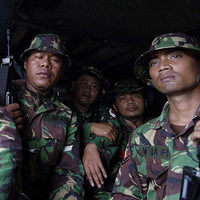
DENPASAR, Indonesia — In the tussle for influence in Southeast Asia, the United States and China have long been competing for Indonesia’s affections. The strategically positioned, resource-rich archipelago is a prized partner in an era of fuel shortages and the global war on terror. But Washington and Beijing have lately expanded their courtship of Jakarta from the traditional areas of trade agreements, foreign direct investment, market access and technical assistance, to increasingly include offers of military hardware and military cooperation. This three-way dance began in 2005, when China and Indonesia announced their “Strategic Partnership.” At the same time, the U.S. […]
Australia’s economy may have weathered the global financial crisis relatively well, but the country’s economic state is still featuring prominently in hopefuls’ campaigns leading up to this weekend’s parliamentary elections. This newly elected parliament will be charged with replacing ousted Prime Minister Kevin Rudd, though his party’s current leader and the country’s interim prime minister, Julia Gillard, may no longer be the obvious choice as successor.
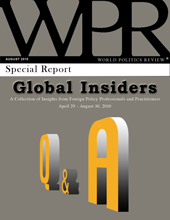
Global Insider is an ongoing World Politics Review interview series that examines developing trends in geopolitics. From maritime disputes and arms sales, to free trade agreements and evolving bilateral relations, Global Insider explores the foundations and implications of new developments in international affairs through the voices of preeminent experts that hail from government, academia and research institutions. Global Insider is published multiple times per week at worldpoliticsreview.com/trend-lines. On this page, and in a pdf document that is available for download by subscribers in our document center, we have collected every Global Insider interview conducted since the series began in April […]
South Korea and Indonesia will jointly develop a 4.5-generation fighter, according to a memorandum of understanding signed last month. In an e-mail interview, Stephanie Neuman, an adjunct professor at Columbia University’s School of International and Public Affairs and a senior research scholar the Saltzman Institute of War and Peace Studies, discusses the advantages and obstacles of an Indonesia-South Korea joint fighter project. WPR: What is the history of this joint fighter project? Stephanie Neuman: Beginning in 1980, development of domestic defense industries was encouraged by the Indonesian government and by the early 1990s various domestic companies were capable of producing […]
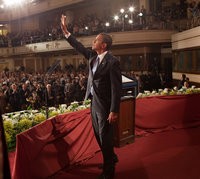
At the beginning of this year, I made the following observation: The novelty of the Obama presidency has worn off. What remains will be a long, hard slog of rebuilding America’s global position. And while the fancy rhetoric of 2009 convinced many to give Washington a second chance, 2010 needs to be the year of delivery. If not, Obama will discover, as Bush did before him, that America cannot lead if others will not follow. More than halfway through 2010, the Obama administration has made some progress on a number of the foreign policy challenges facing the United States. There […]
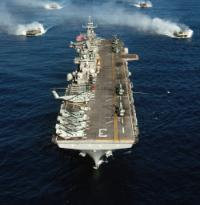
In the 1980s, NATO ground troops in Europe faced a Warsaw Pact force of overwhelming size. To prepare to blunt a Soviet-led attack and overcome the Warsaw Pact’s numerical superiority, NATO adopted a revolutionary new idea. The so-called “AirLand Battle” concept, which originated in the U.S. Army’s training command, posited that forward-deployed NATO tanks and missile-armed infantry, supported by jet fighters carrying smart munitions, could beat a larger Warsaw Pact army. In Europe, the AirLand Battle concept never had a chance to prove itself. But its tenets shaped the U.S. approach to ground warfare in Operation Desert Storm in 1991 […]
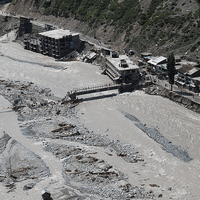
Pakistan’s worst flooding in almost a century may well be remembered as much for the magnitude of the disaster as for the fact that it constituted a major setback in the government’s efforts — backed by its Western and Muslim allies — to defeat Islamist militants allied with al-Qaida and the Taliban. There is a long list of natural and man-made disasters in Islamic countries in which militant Islamists have garnered popularity by quickly and effectively responding with relief and emergency aid, in stark contrast to governments that were slow to react and unable to provide services to victims. By […]

While the traditional approach to national security would suggest that there is no linkage between the security of women and the security of states, there is an interesting new wave of research, informed by the life sciences, that is increasingly undermining that assumption. The organization of male-female relations within a society is one of its strongest and most influential characteristics. Where those relations are based on dominance and inequity, that template will affect the state and its security. Perhaps most interesting is that while the social sciences have been slow to pick up on this, these findings have enjoyed resonance […]
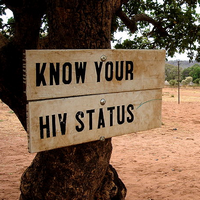
In the post-Cold War world, the rapid social, political and economic transformations associated with globalization have coincided with the continuing spread of HIV/AIDS. In fact, it’s possible to argue that AIDS is both a product and a cause of globalization, understood here as the whole gamut of economic, social, political and epistemological ways in which more and more of the world is brought within similar systems of governance, consumption and imagination. Up to an estimated 14,000 people a day are infected with HIV, and in most parts of the world, infections are increasing more rapidly than are effective responses. In […]

Few pages in the American political playbook have proven more resilient over the last decade than blaming China’s undervalued currency, the yuan, when the U.S. economy sags. When Beijing announced last month that it was unpegging its currency from the dollar and implementing a more flexible exchange rate system, it came after more than a year’s worth of constant but unsuccessful pestering from Congress and the Obama administration. Now, with more than a month of this new “flexible” regime in the books, American politicians are unimpressed with the yuan’s paltry appreciation against the dollar, and are once again calling for […]
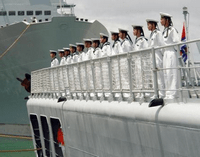
In late-July, Secretary of State Hillary Clinton gently put China on notice regarding its increasingly aggressive claims over the near-entirety of the South China Sea by proposing a formal international legal process to resolve territorial disputes there. Naturally, the Chinese were not pleased, but the proposal was a great move by the Obama administration. Every step that China takes to build up its military power naturally triggers a strong balancing desire throughout the rest of Asia. But with none of those far-smaller economies looking to anger “rising China,” somebody needs to give voice to those fears and create vehicles for […]
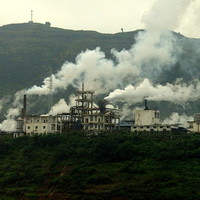
Unless you have been living under a rock, the news that China has become the world’s top energy consumer should not have been surprising. For some years now, China has been steadily marching up the global energy consumer rankings, an ascension that was expedited by the severity of the recession’s impact in the U.S. The International Energy Agency (IEA), whose data confirmed the dubious milestone, called it a “new age in the history of energy.” Even if it is not entirely surprising, the news does beg further analysis because of its implications for global energy markets and international affairs. It […]

BEIJING — Over the past decade and more, China has capitalized on critical transformations in the global landscape to forge new patterns of political and economic influence and significantly further its national interests. But in so doing, it has also become exposed to a growing matrix of risks to its capacity for continued international expansion. While this exposure has rendered China more vulnerable to external actors and threats, the greatest obstacles facing the country’s future trajectory ultimately come from structural deficiencies in the domestic political economy. In the international arena, although China’s most recent gains have been impressive, much of […]
